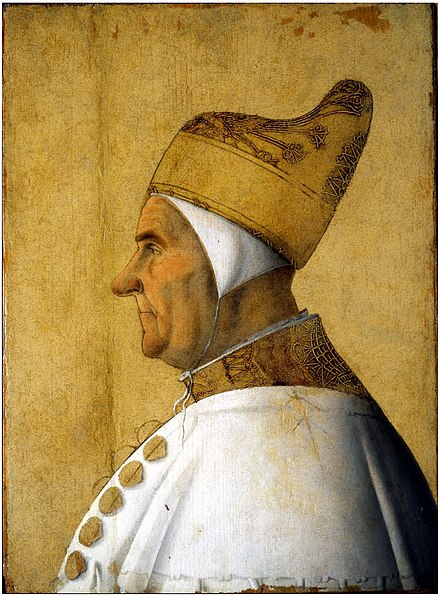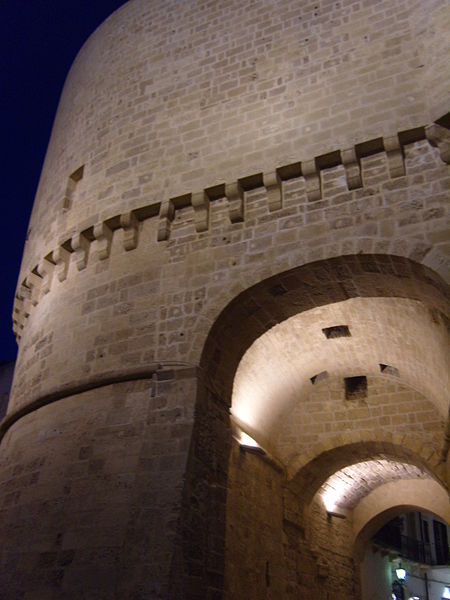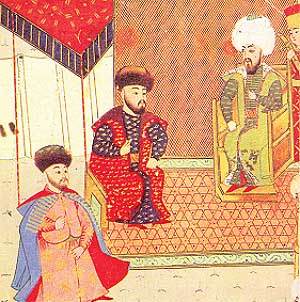 |
| Mehmet |
Back into Anatolia
It was not
until the autumn of 1472, after consulting with his astrologers as was his
custom, that Mehmet personally led his armies into Anatolia. Prince Mustafa and
Prince Bayezid accompanied their father along with Davud Pasha. Mehmet
reinstated Mahmut Pasha as Grand Vizier, recognising that he was;
‘The most valiant and
practical man that he had at his court.’[i]
The army
went into winter quarters in Amasya and the spring saw them march to Erzincan where Hass Murad Pasha, one of Mehmet’s most favoured generals, led an
attack into an ambush that saw him and his men annihilated.
A furious
Mehmet saw no option but to retreat; Uzun Hasan decided to seize the moment and
a week later proffered battle at Otlukbeli. An eight hour battle on
11th August 1473 left the White Sheep tribe routed; felled by Mehmet’s artillery, an innovation Uzun
Hasan’s people had not seen before. Uzun himself fled the battlefield.
 |
| Battle at Otlukbeli |
Internal Revolt
The 14 year
old Prince Jem had been left in charge of Adrianople with a small force, under
the supervision of his tutors Nasu Bey and Kariștiranli Süleman Bey. The news
of Uzun Hasan’s victory at Erzincan had been published abroad by the Venetians.
After hearing nothing from his father for forty days Jem decided to take charge
and usurp the throne.
 |
| Prince Jem as an adult |
When the
news of the victory at Otlukbeli arrived Jem fled but was forgiven by Mehmet,
who may have recognised some of his own youthful impetuosity in the boy. Jem’s
tutors were not so lucky and were both punished. Jem was sent as governor to Kastamonu. Mehmet then dismissed Mahmut Pasha again, blaming him for the fiasco at
Erzincan. According to one Angiolello[ii];
‘The Turkish Signor was angry that Mahmut Pasha
withdrew….and did not give help to Murat, and it was suspected that he had done
that on purpose, because he was not his friend.’[iii]
Death of a Son
Mehmet spent
1474 in Istanbul, taking his ease in the Topkapi Palace while Mustafa governed
in Konya, the capital of Karaman, Beyazid was in Amasya and Jem governed in
Kastamonu.
The autumn of
1473 Mustafa spent boating on Lake Beyșehir. In the early winter he sent troops with the intention of
besieging Develi Karahisir. The Karamanid garrison refused to
submit to any but Mustafa who journeyed to the region with great difficulty as
he had fallen ill.
Mustafa’s
condition worsened and his advisers decided to send him back to Konya and
notified Mehmet. Mehmet sent an army of 30,000 under Gedik Ahmet Pasha to
Develi Karahisir and his own physician to attend Mustafa. Mustafa died in June
en route at Bor and his body was embalmed and taken to Konya.
Mehmet’s old
tutor Hoca Sinan Pasha was the only one of Mehmet’s entourage brave enough to
inform the Sultan of the death of his favourite son.
‘He [Mehmet] gathered the
dust and placed it over his head, as a sign of great sorrow. And he was beating
his face, his chest and his thighs with his palms, and he groaned greatly. And
he remained this way for three days and three nights………..Mustafa was especially
beloved of his father and of all those who had dealings with him.’[iv]
Mehmet had
Mustafa buried at the Muradiye and Mustafa’s daughter Princess Nergiszade gave
a one hour oration praising her father. Jem was transferred to become governor
of Konya in his brother’s place. Mehmet blamed Mahmut Pasha for Mustafa’s
death; the two men had become enemies although the reason(s) are unknown.
Mahmut Pasha was arrested and executed on 18th July 1474.
Further Distractions
 |
| Giovanni Mocenigo |
In January
1475 Mara Branković again approached the Venetians with a peace proposal. Many
of the Venetian Senate were opposed to considering the idea, but the Doge, Giovanni Mocinego, speaking with the voice of reason, overcame the
opposition and emissaries were sent to Istanbul. The negotiations broke down in
the October and the two parties were back at each other’s throats in short
order.
In June 1475
the defenders of Kaffa[v] surrendered to the Ottoman fleet[vi] which then went on to
capture all the other Genoese Crimean possessions and the Venetian colony of Tana[vii] on the Sea of Azov.
Mehmet led
an army into Moldavia in the spring of 1476 to fight Count Stephen; battle was joined at Razboieni on 26th July. The battle
was intended as an ambush by the Moldavians but the battle left them with 2,000
dead and 8,000 of Count Stephen’s men taken prisoner.
 |
| Count Stephen |
‘We put Count Stephen to
flight, seized the artillery, and followed him into the wood…..if the wood had
not been so dense and dark because of the height of the trees, few would have
escaped.’[viii]
The
Hungarians attacked after Mehmet withdrew and the news reached him in
Adrianople. He turned round and marched to Serbia and attacked Smederevo where Matthias Corvinus had built three forts to defend the city. The
garrison surrendered under promise of safe conduct and then Mehmet razed the
forts to the ground before returning home.
A Short Lived Peace
 |
| Friuli region |
Meanwhile the
Ottomans were also besieging Scutari[ix] but nearer to Venice Turkish
irregulars were overrunning Friuli up to the river Livenza. The Venetians’ attention was diverted by problems in
Florence; Lorenzo and Giuliano de’ Medici were attacked on Easter Day 1478.
Giuliano was killed and Lorenzo took swift and merciless retribution against
his enemies who included the nephews of Pope Sixtus[x]. It would be almost
impossible for Italy to present a united front to the infidels for some years
to come.
Mehmet’s
plans were further assisted by the death of Uzun Hasan on 6th
January in Tabriz. 1478 saw the fall of Kruje,
Skanderbeg’s fortress, as well the taking of Lezhe where he had died. The
advances in Albania and the attacks in Friuli brought the Venetian Senate to
consider coming to terms with Mehmet.
 |
| Vathia in the Maini peninsula |
The peace
treaty was signed on 28th January 1479; the Venetians ceded Scutari,
Kruje, Lemnos, Negroponte and the Maini peninsula in the Morea. Mehmet agreed to return some of the Venetian
possessions the Ottoman army had taken in the Morea, Albania and Dalmatia. The
Venetians agreed to pay 100,000 gold ducats[xi][xii] reparation and an annual
tribute of 10,000 ducats[xiii] for the right of free
trade in the Ottoman empire without import or export duties.
Mehmet swore
an oath of agreement;
‘By the God of Heaven and
earth, by our great Prophet Mohammed, by the seven copies of the Koran which we
Moslems possess and profess, by the 124,000 prophets of God by the faith which
I believe and profess, by my soul and the soul of my father, and by the sword
with which I am girded.’[xiv]
 |
| The fortress at Otranto |
The
Venetians had achieved peace, but at a price; her fellow Christian countries
reviled her for coming to terms with the infidel. And adding salt to the
wounds, later in 1479 the Ottomans invaded and took the Ionian islands and the following year seized Otranto[xv].
Death of a Conqueror
In the
summer of 1480 Mehmet launched an attack on Rhodes, a hive of resistance to his
suzerainty of the eastern Mediterranean. As winter drew on the besiegers
withdrew and no doubt Mehmet intended to return the following year. His death
on 3rd May 1481, after 31 years on the throne, intervened.
Mehmet had
spent the winter in the Topkapi and Istanbul was riddled with rumours of his
ill-health. He was having an army muster at Üsküdar on the shores of the Bosphorus, but he had not indicated his
plans for the summer. Mehmet joined the army on 25th April and the
Grand Vizier Karamani Mehmet Pasha ordered the troops to march down the shores
of the Sea of Marmara.
 |
| Sultan Bayezid II |
A halt was
called at Gebze as Mehmet was suffering severe
abdominal pains. His Persian physician, Hamiduddin al-Lari, gave Mehmet
medications that only made matters worse. Accordingly his Jewish physician
Master Iacopo was called in and diagnosed a blockage of the intestines. Master
Iacopo was unable to do anything but alleviate the pain with large doses of
opium. Mehmet lingered on until the 3rd, dying at ten o’clock, still
only forty-nine. He had;
‘Besides the gracious gift
of the conquest of Constantinople, Fatih wrested twenty or more independent
lands from the enemies of His High Estate.’[xvi]
Jem made a
bid for the throne but the Janissaries threw their weight behind Bayezid the
scholar and Jem lived the rest of his life as a stranger in a strange land,
initially in Rhodes enjoying the hospitality of the Knights of St John and then
in Rome as a guest of the Pope.
Bibliography
The Grand
Turk – John Freely, I.B. Tauris and Co Ltd, 2009
The
Janissaries – Godfrey Goodwin, Saqi Books 1994
Lords of the
Horizons – Jason Goodwin, Henry Holt & Co 1998
The Ottoman
Empire – Halil Inalcik, Phoenix 1994
The Ottoman
Empire – Lord Kinross, Folio Society 2003
A History of
Venice – John Julius Norwich, Penguin Books 1982
The Ottoman
Empire – Andrina Stiles, Hodder & Stoughton 1989
www.wikipedia.en
[i]
The Grand Turk - Freely
[ii]
An Italian captive in the service of the Ottomans
[iii]
The Grand Turk - Freely
[iv]
Ibid
[v]
One of the Genoese trading settlements in the Crimea
[vi]
The Italians were resettled in Istanbul and a census of 1477 recorded that they
lived in 277 houses and had 2 churches
[vii]
Now Azov
[viii]
The Grand Turk - Freely
[ix]
Now Shkoder in Albania
[x]
Who Lorenzo knew secretly supported the botched assassination
[xi]
The word gold before currency signifies payment in coin; use of the word ducat
on its own meant that the money was on account.
[xii]
In 2013 the relative: historic standard of
living value of that income or
wealth is £65,040,000.00
economic
status value of that income or
wealth is £1,905,000,000.00 economic power value
of that income or wealth is £28,850,000,000.00 www.measuringworth.com
[xiii]
In 2013 the relative: historic standard of
living value of that income or wealth
is £6,504,000.00
economic
status value of that income or
wealth is £190,500,000.00 economic power value
of that income or wealth is £2,885,000,000.00 www.measuringworth.com
[xiv]
The Grand Turk - Freely
[xv]
Part of the possessions of the Kingdom of Naples, on the heel of Italy
[xvi]
The Grand Turk - Freely
No comments:
Post a Comment
Note: only a member of this blog may post a comment.